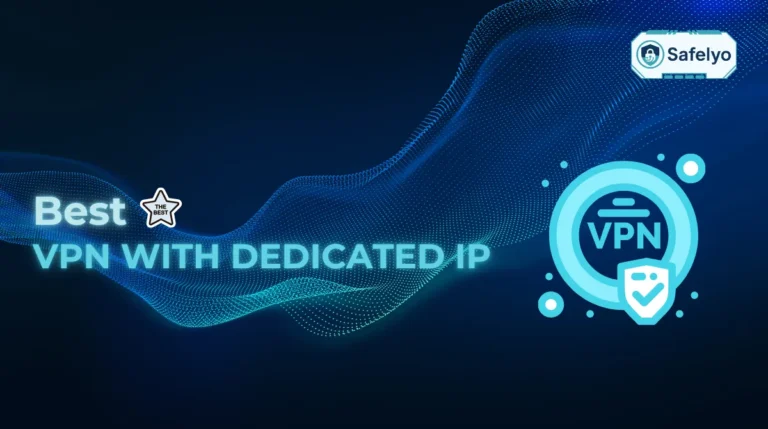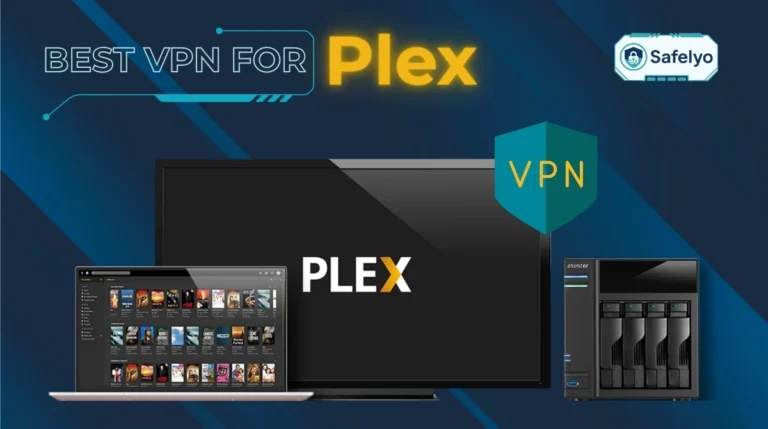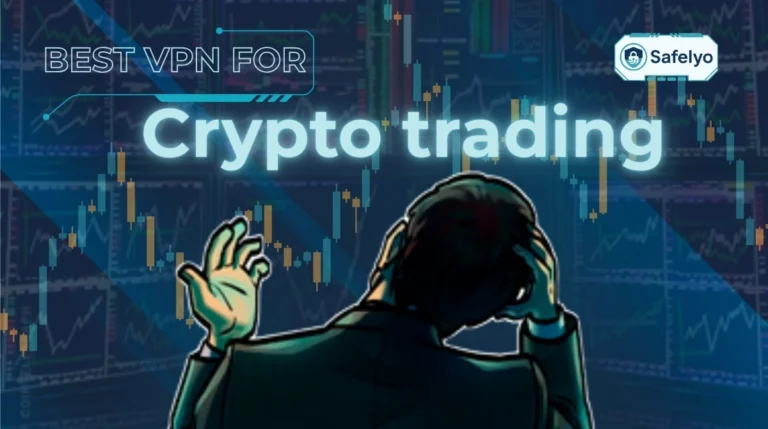A “no-logs” policy is arguably the single most important promise a VPN provider can make. It’s their pledge to be blind to your online world, keeping your browsing history, downloads, and private data exactly that – private.
But in an industry flooded with flashy marketing, how can you tell a genuine promise from a hollow one? Let’s be honest: a shiny “no-logs” badge on a website means very little on its own. True privacy requires proof.
Having spent years investigating VPN infrastructure and dissecting privacy policies, I’ve seen firsthand how easily users can be misled. That’s why we didn’t just take their word for it. We dug into the evidence: third-party audits, real-world court cases, and the technology behind their servers to find the best no-log VPN services that have actually been put to the test.
In this evidence-based guide, you’ll discover:
- The difference between marketing fluff and a verified no-log policy.
- How third-party audits and real-world court cases prove a VPN’s claims.
- Our ranked list of VPNs that have truly earned their no-log status.
- The “hall of shame”: VPNs that have been caught logging user data.
Forget the marketing fluff. Let’s dive into the hard evidence and see which VPNs have truly earned the right to protect your privacy.
1. Safelyo’s no-log trust meter: Rating the evidence
After analyzing dozens of VPN privacy policies, I realized a simple “yes/no” for logging wasn’t enough. The quality of the evidence matters. A VPN that has proven its policy in court is vastly more trustworthy than one that has only made a promise on its website.
To cut through the noise, we developed a simple system: The Safelyo No-Log Trust Meter.
Think of it like evaluating a chef. Anyone can claim they are a great cook. But how do you really know? You look for levels of proof.
- Level 1: Policy claim (The chef’s own menu). A necessary start, but it’s just a promise, not proof.
- Level 2: Independent audit (A food critic’s review). The VPN has been inspected by a reputable firm. This is highly credible evidence.
- Level 3: Real-world proof (Winning a high-stakes cooking competition). The VPN’s policy has survived a real-world challenge like a court order or server seizure. In my book, this is the highest level of trust a VPN can earn.
Now that you understand our rating system, here’s a quick look at how our top-rated no-log VPNs stack up against the Trust Meter.
Top no-log VPNs: A quick comparison
| VPN Provider | No-Log Trust Meter | Key Proof | RAM-Only Servers | Best For |
|---|---|---|---|---|
| ExpressVPN | Level 3 (Highest) | Server seizure in Turkey | YES | Real-world proof |
| NordVPN | Level 2 (Very High) | 4× independent audits | YES | Continuous verification |
| Private Internet Access (PIA) | Level 3 (Highest) | Proven twice in court | YES | Legally-tested privacy |
| Surfshark | Level 2 (Very High) | Audited by Deloitte | YES | Value and features |
| Mullvad | Level 2 (Very High) | Audited, anonymous accounts | YES | Ultimate anonymity |
Let’s dive into the specific evidence for each of these proven services.
2. The best no-log VPNs of 2025: Verified and ranked
We’ll now break down why each of these VPNs earned its place on our list, focusing on the hard evidence that backs up their privacy promises.
2.1. #1 – ExpressVPN
When discussing no-log VPNs that have truly been tested under fire, ExpressVPN is almost always the first name that comes to my mind. It has built its stellar reputation not just on promises, but on surviving a real-world test that has become a legendary case study in the privacy community.
KEY SPECIFICATIONS:
Audits: Multiple audits by PwC, KPMG, and Cure53.
Jurisdiction: British Virgin Islands (BVI) - No data retention laws.
Server Network: Servers in 105 countries.
Payment Options: Credit card, PayPal, Bitcoin.
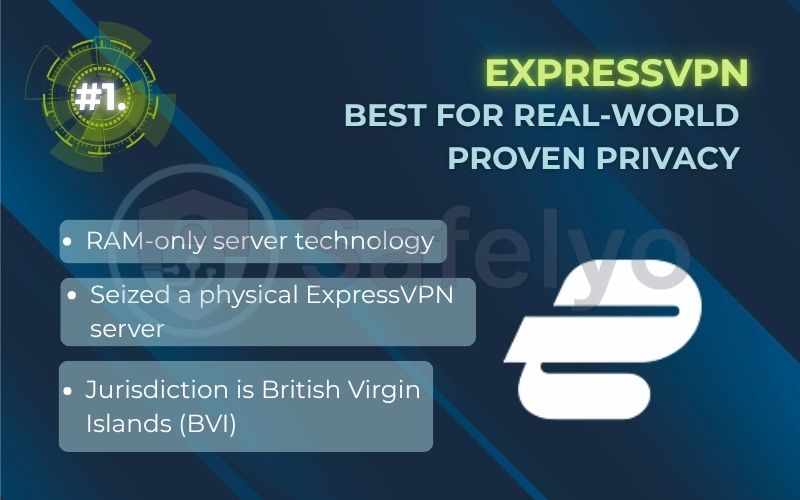
If you want the ultimate peace of mind – the kind that comes from a no-log policy being tested in a real-world crisis and emerging unscathed – ExpressVPN is the undisputed choice.
- Real-World Proof: This is where ExpressVPN truly shines. In 2017, Turkish authorities seized a physical ExpressVPN server. They were hoping to find data that would identify a user. What they found was… absolutely nothing. Because no logs were stored, there was no data to recover. This is a fact proven under intense legal pressure.
- Technology: ExpressVPN pioneered the use of RAM-only server technology (TrustedServer) across its entire network. I often explain this like working on a whiteboard instead of a notebook. As soon as the server is rebooted, the slate is wiped completely clean.
ExpressVPN: Best for real-world proven privacy
>> Ready for a deeper dive? See our full, hands-on ExpressVPN Review to check its speed and streaming performance.
2.2. #2 – NordVPN
If ExpressVPN’s fame comes from a single, dramatic event, NordVPN’s reputation is built on consistency and relentless transparency. In my analysis, no other top-tier provider has invested as heavily in continuous, third-party audits. They’ve made “trust, but verify” their core philosophy.
KEY SPECIFICATIONS:
Audits: Four separate no-log audits by PwC and Deloitte.
Jurisdiction: Panama – A privacy-friendly location with no data retention laws.
Server Network: 6,300+ servers in 111 countries.
Payment Options: Credit card, PayPal, Google Pay, Amazon Pay, and Cryptocurrency.
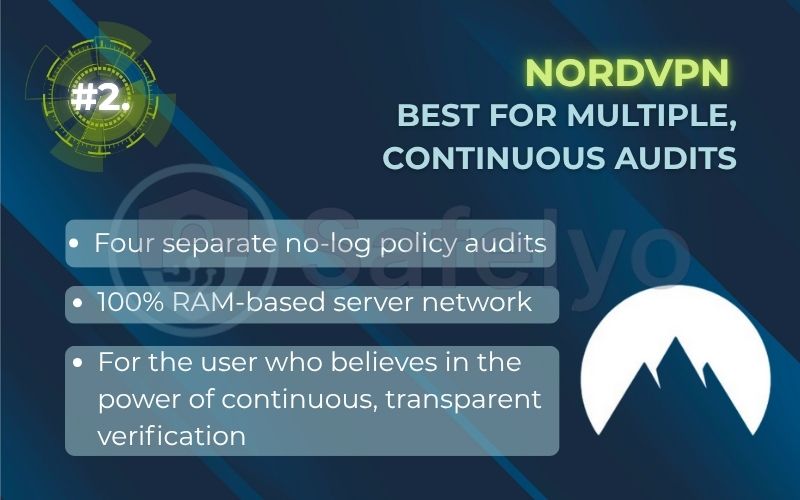
NordVPN is for the user who believes in the power of continuous, transparent verification. Its four separate no-log audits provide consistent, reliable evidence that you can count on.
- Audits: What impresses me most about NordVPN is its commitment to verification. They have undergone four separate no-log policy audits from two of the biggest names in the business: PwC and Deloitte. This isn’t a one-off check; it’s an ongoing commitment.
- Technology: Like the other top providers, NordVPN operates a 100% RAM-based server network. They also accept cryptocurrency payments for enhanced anonymity and offer advanced features like Double VPN, which routes your traffic through two separate servers.
NordVPN: Best for multiple, continuous audits
>> Want to know more about its specialty servers? Explore all the details in our complete NordVPN Review.
2.3. #3 – Private Internet Access (PIA)
Private Internet Access is a fascinating and powerful case in the world of no-log VPNs. While some users might pause at its US jurisdiction, I always point to its history as the ultimate counter-argument. PIA has done something few others have: proven its no-log policy in a court of law, not just once, but twice.
KEY SPECIFICATIONS:
Audits: Four separate no-log audits by PwC and Deloitte.
Jurisdiction: Panama - A privacy-friendly location with no data retention laws.
Server Network: 6,300+ servers in 111 countries.
Payment Options: Credit card, PayPal, Google Pay, Amazon Pay, and Cryptocurrency.
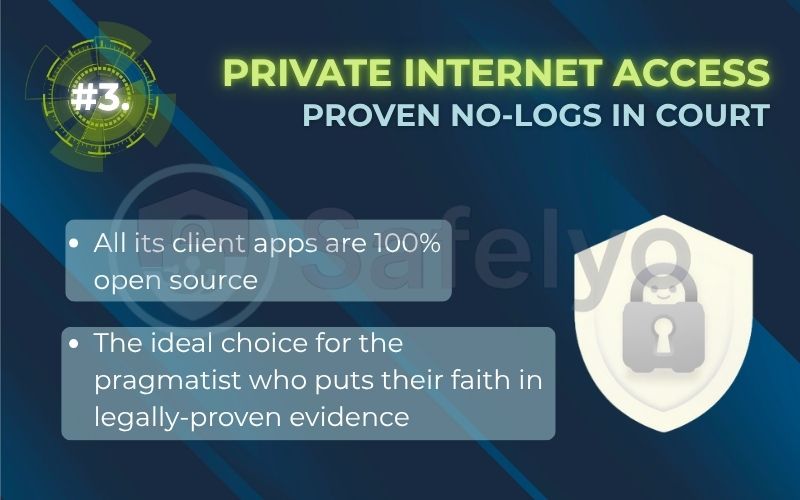
PIA is the ideal choice for the pragmatist who puts their faith in legally-proven evidence. Their track record in US court cases is a steel-plated guarantee of their no-log policy, overcoming any concerns about its US jurisdiction.
- Real-World Proof: This is where PIA’s history speaks volumes. On two separate occasions, US federal authorities have officially requested user data logs from PIA. Both times, PIA’s response was simple and powerful: “We don’t store logs, so we have nothing to give you.” This provides a rock-solid, legally-tested track record.
- Technology: A huge point in PIA’s favor is that all its client apps are 100% open source. I like to think of this as a restaurant with an open kitchen, inviting anyone to inspect their code for flaws.
Private Internet Access (PIA): Proven no-logs in court, twice
>> Curious about its advanced settings? Find out everything you need to know in our detailed PIA Review.
2.4. #4 – Surfshark: Best value for proven privacy
In the crowded VPN market, Surfshark has carved out a unique space for itself by offering a premium, audited no-log policy at an incredibly competitive price point, along with unlimited device connections. While it’s often seen as a budget-friendly option, I always emphasize that its commitment to privacy is anything but cheap, backed by a solid audit from a “Big Four” accounting firm.
KEY SPECIFICATIONS:
Audits: No-log policy audited by Deloitte.
Jurisdiction: The Netherlands - Strong privacy laws.
Connections: Unlimited simultaneous connections.
Payment Options: Credit card, PayPal, Google Pay, Amazon Pay, and Cryptocurrency.
Surfshark proves that you don’t have to sacrifice verified privacy for affordability. It’s the perfect choice for individuals or families who need to protect a large number of devices without compromising on a core, audited no-log policy. It delivers exceptional value backed by credible proof.
- No-Log Trust Meter: Level 2 (Very High)
- Audits: Surfshark took a major step in cementing its trustworthiness by commissioning an independent audit from Deloitte. The auditors examined their server infrastructure and confirmed that their internal policies prevent the logging of user activity or IP addresses. For a provider known for its value, this investment in verification is a powerful statement.
- Technology: Like its top-tier competitors, Surfshark has transitioned its entire network to 100% RAM-only servers, ensuring no data can be physically stored long-term. They also offer a “Camouflage Mode,” which makes it so even your internet provider can’t tell you’re using a VPN.
Surfshark: Best value for proven privacy
>> Want to see how it performs on all your devices? Check out our comprehensive Surfshark Review for more details.
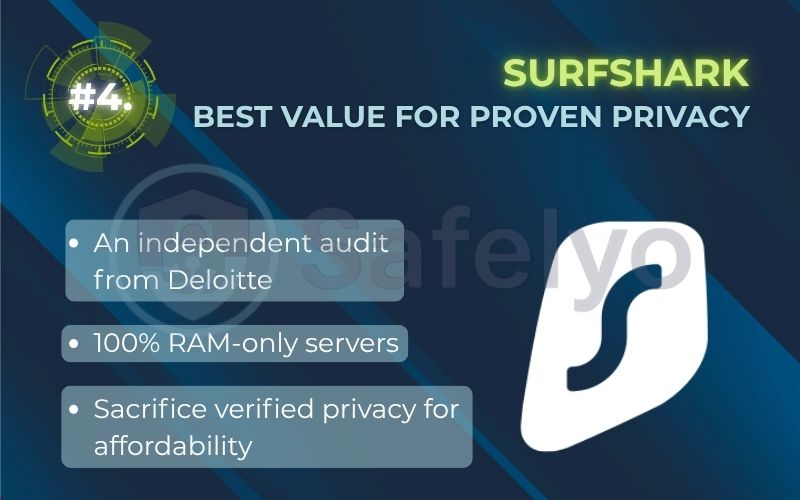
2.5. #5 – Mullvad VPN: Best for ultimate anonymity
When I talk to true privacy purists, Mullvad is a name that always comes up. This Swedish provider is less of a commercial product and more of a privacy project. Its entire service is built around a single goal: to know as little about its users as humanly and technologically possible. Their approach to “no-logs” goes beyond policy – it’s embedded in their DNA.
KEY SPECIFICATIONS:
Audits: Regular, in-depth audits on its infrastructure and no-log policy.
Jurisdiction: Sweden - Strong privacy laws, and has won a court case to protect user data.
Account Creation: No email or personal info required; uses a randomly generated account number.
Payment Options: Accepts cash (by mail), Cryptocurrency, credit card, and PayPal.
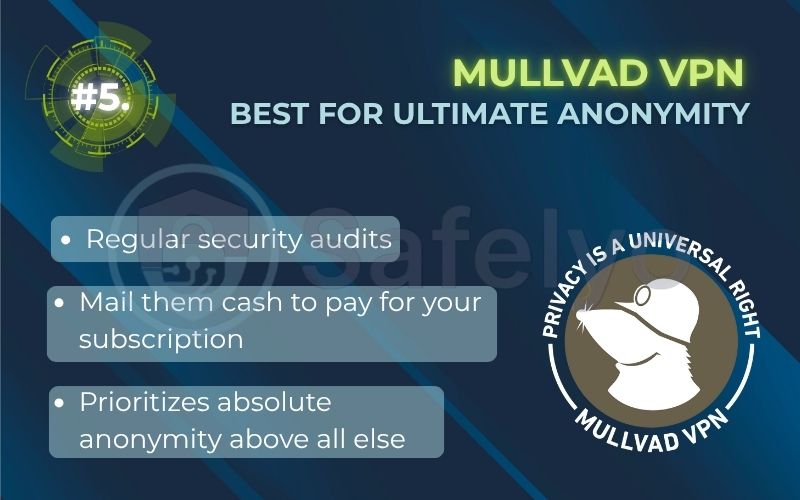
Mullvad is for the user who prioritizes absolute anonymity above all else. While other VPNs protect what you do online, Mullvad goes a step further by making it possible to hide who you are from the service itself. If your goal is to leave the smallest possible footprint, Mullvad is the gold standard.
- No-Log Trust Meter: Level 2 (Very High, with bonus points for anonymity)
- Audits: Mullvad is deeply committed to transparency, undergoing regular security audits from third parties like Cure53. These audits have consistently verified their no-log claims and the security of their infrastructure.
- Real-World Proof: While not a logging case specifically, Mullvad successfully fought a search warrant in court in 2023, where authorities left empty-handed because there was simply no customer data to be found, reinforcing their operational security.
- Technology & Anonymity: This is where Mullvad is in a league of its own. You don’t need an email to sign up; you get a random 16-digit account number. You can even mail them cash to pay for your subscription. It’s the only provider on this list where it’s possible to create an account and pay for it with absolutely zero digital or personal paper trail.
Mullvad VPN: Best for ultimate anonymity
>> Interested in its unique account system? Learn more about its privacy-first approach in our full Mullvad Review.
3. The hall of shame: VPNs that were caught logging data
To truly appreciate the importance of verified, audited no-log policies, I believe it’s essential to look at what happens when that trust is broken. History has shown us that a “no-log” claim on a website is, unfortunately, not always the truth. These cases serve as powerful reminders of why we must demand proof.
Think of it this way: if a friend promises to keep a secret but then tells everyone the first time they’re asked, you’d be wary of trusting them again. The same principle applies here.
PureVPN (Pre-2018)
This is perhaps the most famous case. For years, PureVPN advertised a strict “zero-log” policy. However, in 2017, court records revealed they had provided logs to the FBI to help identify a user in a cyberstalking case. The promise was broken. To their credit, PureVPN has since changed ownership and now has an always-on audit policy, meaning they can be audited without notice. But their past serves as a crucial lesson: a policy is only a policy until it’s tested.
IPVanish (Pre-2017)
In a similar incident, IPVanish was compelled to provide user data to US authorities in 2016, despite also marketing a “no-log” policy at the time. It was another case of a provider’s actions not matching their promises. Like PureVPN, IPVanish has since changed hands and has had its no-log policy verified by independent auditors, but the history remains a testament to why today’s standard of third-party audits is so critical.
Most "Free" VPNs (e.g., Hola VPN)
This is a different category of problem. Here, the issue isn’t just a broken promise; it’s the entire business model. I always tell people to remember the old saying: “If you’re not paying for the product, you are the product.” Many free VPNs survive by logging your data – your browsing history, your habits – and selling it to advertisers and data brokers. Hola VPN was famously caught turning its users’ computers into a botnet, selling their bandwidth to others. This isn’t just bad privacy; it’s a fundamental betrayal of the user.
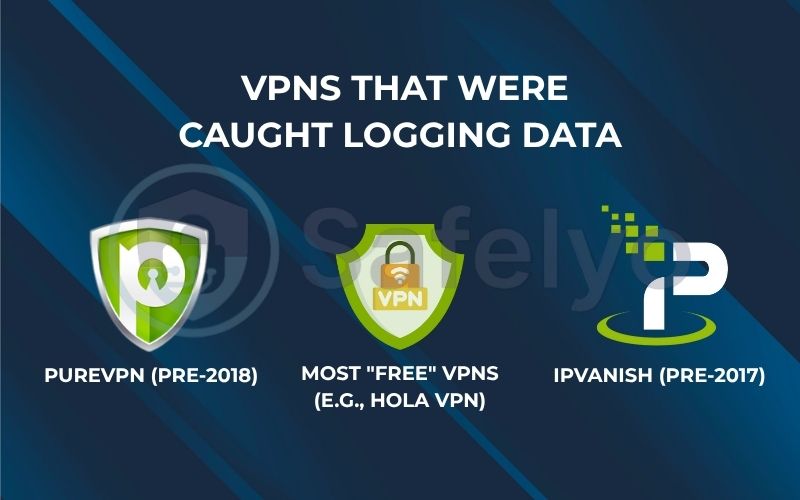
These examples aren’t just here to point fingers. They are the reason why, throughout this article, I have relentlessly focused on independent audits and real-world proof. A trustworthy VPN doesn’t just make a promise; it builds a system so transparent and secure that it couldn’t log your data even if it wanted to.
4. What VPNs log and why audits matter
When a VPN service says “we don’t keep logs,” it’s easy to assume they record absolutely nothing. In my experience, that’s a bit of an oversimplification. The reality is more nuanced, and understanding this difference is the first step to choosing a truly private service. Not all “logs” are created equal, so let’s break them down.
4.1. Activity logs vs. connection logs
Imagine you’re sending a private letter. There are two types of information someone could spy on: The contents of your letter, and the details on the envelope.
Activity logs (The unforgivable)
This is the content of your letter. It includes your browsing history (which sites you visit), the files you download, the services you use, and your DNS queries. For any VPN that takes your privacy seriously, this type of data should never, ever be logged. There are no excuses. If a VPN records this, its “no-log” claim is meaningless.
Connection logs (The gray area)
This is the information on the envelope. It’s metadata about your connection, not what you did during it. This might include the time you connected, which server location you used (e.g., “New York #27”), and the total amount of data transferred (e.g., 500MB). Reputable VPNs that collect this do so in an aggregated and anonymized way. They can see that their servers are being used, but they can’t tie any specific activity back to a specific user. This helps them maintain their network and prevent abuse, which is generally acceptable if they are transparent about it.
4.2. Why a third-party audit is the gold standard
So, a VPN promises that they don’t read the contents of your letters. How can you be sure? You could just trust them, or you could ask for proof.
Think of it like a restaurant claiming its kitchen is spotless. You might believe the owner, but you’d feel much more confident if you saw a certificate on the wall from an independent health inspector. That’s exactly what a third-party audit is.
Companies like PricewaterhouseCoopers (PwC), Deloitte, or Cure53 are the “health inspectors” of the VPN world. They go into a VPN provider’s systems, examine their code and server infrastructure, and verify if their practices match their privacy policy. When I evaluate a VPN, one of the first things I look for is a recent, public audit report from a reputable firm. It’s the closest thing we have to an objective seal of approval.
4.3. Real-world tests: The ultimate proof
While an audit is fantastic proof, there’s one level even higher: A real-world trial by fire.
This is when a VPN’s no-log policy is tested not by friendly auditors, but by authorities with a warrant. It happens when a government seizes a VPN’s server to investigate a user, or when a court demands that the company hand over user data. If the VPN company has nothing to give them – because no-logs ever existed – that is the ultimate, undeniable proof that their no-log policy is real.
As we go through our top picks, you’ll see that the services we rank highest are the ones that have not only passed audits but have also proven their claims in these high-stakes, real-world scenarios.
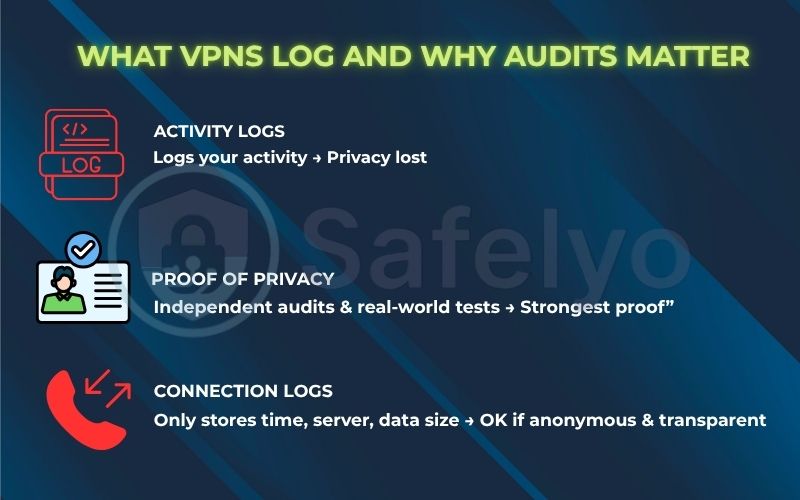
5. FAQ about the best no-log VPN
Even with all this evidence, it’s natural to have a few lingering questions. In my years of helping people navigate the world of digital privacy, these are some of the most common and important questions that come up. Here are the straight answers.
Do any VPNs really keep zero logs?
“Zero logs” is more of a marketing term than a technical reality. Even the best no-log VPN services need to collect some minimal, non-identifying data to run their service, like the overall load on a server or total bandwidth used for maintenance. The crucial difference is that this data is anonymized and aggregated. It can’t be used to trace any specific activity back to you. They know someone used the highway, but they don’t know who it was or where they went.
How can I verify a VPN’s no-log claim myself?
The best way is to look for their latest third-party audit report. Reputable VPNs usually publish these on their blog or in a dedicated “transparency” section. Beyond that, search for news about real-world tests, like the court cases involving PIA or the server seizure of ExpressVPN we discussed. A VPN that is transparent about these things is a trustworthy VPN.
Can police track a true no-log VPN?
No. If a VPN truly does not keep logs, there is simply no data to provide to law enforcement, even with a warrant. Police cannot track what does not exist. This is the very foundation of a no-log policy and why choosing a service with proven, audited claims is so critical for your privacy.
What is the best free no-log VPN?
From my experience, Proton VPN is the only free VPN I can confidently recommend. It’s operated by the same team behind Proton Mail and is funded by its paying users. This means their business model is built on privacy, not on selling your data, and their no-log policy has been independently audited.
Are ‘no-log’ policies becoming harder to maintain with new laws?
Yes, the legal landscape is constantly changing, which makes a VPN’s jurisdiction and commitment to transparency more important than ever. This is precisely why top providers are proactively moving to RAM-only servers and undergoing regular audits. They are building systems that are technically incapable of logging, which is the best defense against any future data retention laws.
Which VPN can I use without logging?
If you mean without providing any personal information like an email address, Mullvad is the champion here. It doesn’t require any personal data to create an account; you’re just given a random account number. This design offers an exceptional level of anonymity from the very start.
Which VPN is untraceable?
While no consumer technology is 100% “untraceable” in every theoretical scenario, a top-tier, audited no-log VPN like ExpressVPN, PIA, or NordVPN makes tracing your online activity back to you practically impossible for third parties like your ISP or data snoops. For maximum untraceability, combining a service like Mullvad with an anonymous payment method (like mailing cash) is as close as you can get.
Are no-log VPNs legal?
Yes, in the vast majority of countries, including the US, UK, Canada, and most of Europe, using a no-log VPN is perfectly legal. VPNs are legitimate tools used by millions for privacy and security. Only a few countries with heavy censorship (like China or North Korea) restrict or ban their use.
Is NordVPN really no-logs?
Yes. NordVPN’s no-log policy has been independently verified four separate times by two of the world’s leading auditing firms, PwC and Deloitte. While it hasn’t faced a public court case like PIA, this continuous and consistent auditing provides extremely strong evidence that they stand by their no-log claims.
What’s the best no-log VPN overall?
While the “best” depends on the proof you trust most, ExpressVPN often stands out as the best all-around choice. It combines the highest level of real-world proof (the Turkish server seizure), consistent audits, RAM-only servers, and a seamless user experience. While PIA’s court record and NordVPN’s audit frequency make them equally powerful contenders, ExpressVPN’s proven performance under pressure makes it our top overall recommendation for most users.
6. Conclusion
In the world of digital privacy, the term “no-logs” is thrown around so often that it’s easy to become numb to it. But as we’ve seen, the difference between a simple marketing claim and a battle-tested, verified policy is enormous. Choosing a true no-log VPN isn’t about trusting a brand’s slogan; it’s about trusting the evidence.
To ensure your online activities remain truly private, remember these key takeaways:
- Proof over Promises: Always prioritize VPNs that can prove their claims with independent audits or real-world court cases.
- Not All Logs Are Equal: A reputable VPN will never record your activity (what you do), though some may keep minimal, anonymized connection data (that you connected) for maintenance.
- Technology Matters: Features like RAM-only servers and open-source apps are not just buzzwords; they are technical safeguards that reinforce a no-log policy.
- Beware of “Free”: Most free VPNs are free for a reason. Their business model often depends on logging and selling your data.
Your privacy is non-negotiable. By choosing a service from Best VPN list of verified providers that Safelyo suggests, you’re not just buying a VPN; you’re investing in a proven shield for your digital life. Take control of your privacy today by selecting one of the best no-log VPN services that have truly earned their stripes.

